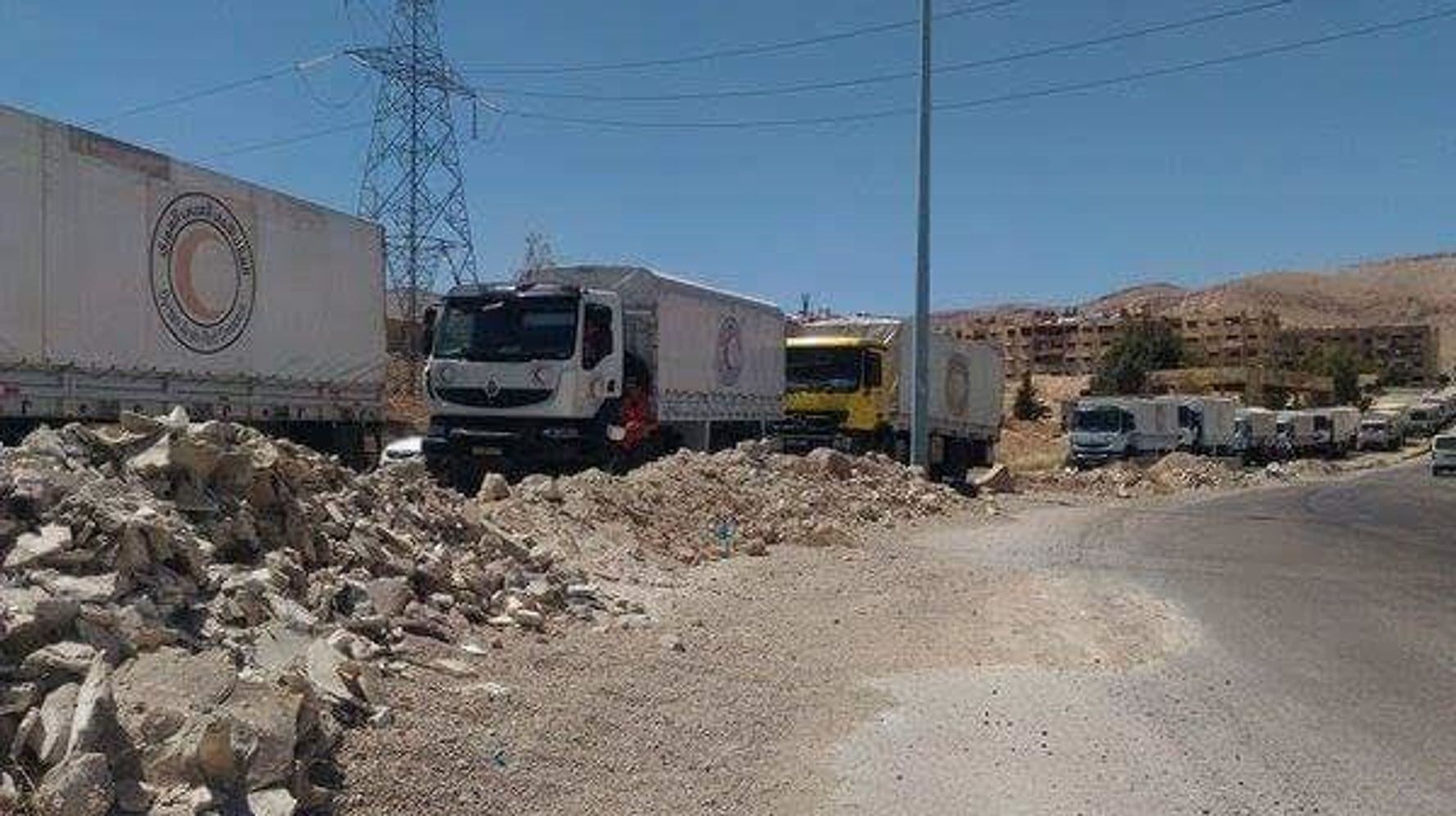ISTANBUL — International aid groups on Wednesday successfully delivered food and life-saving supplies to an estimated 10,000 Syrians living in a besieged Damascus suburb. Children crowded around the aid convoy excitedly, activists said, adding that locals danced and sang as the convoy pulled in, especially welcoming the arrival of flour.
The delivery, a collaboration between the United Nations, the Syrian Red Crescent and the International Committee of the Red Cross, was the first of its kind to make it to Harasta, a rebel-held area that has been under siege by the Syrian government since 2013.
“Despite a very volatile situation on the ground, the 29-truck convoy carried food, hygiene items, medicines and medical materials such as delivery kits for expecting mothers and school kits,” said Pawel Krzysiek, a spokesman for ICRC in Syria.
Five years into a revolution-turned-civil war, at least 470,000 Syrians have been killed, according to one recent estimate, and half the country is displaced by violence. While today’s aid delivery is a victory for humanitarian organizations, it’s a mere drop in the pond in terms of accessing the millions of Syrians in need of aid and support.
#Breaking: @SYRedCrescent #Humanitarian #Aid convoy supported by @UN Offices and @ICRC is heading to #Harasta pic.twitter.com/JhQoadKclv
— Syrian Red Crescent (@SYRedCrescent) May 18, 2016
Bashar Assad’s government has refused aid agencies access to roughly half of the 905,000 people in besieged areas characterized as “hard to reach,” according to U.N. humanitarian adviser Jan Egeland. And the rest of the aid is difficult to deliver, as much of it comes with conditions set by the government.
In January, a complicated plan to deliver aid to some 60,000 Syrians — a synchronized effort that had to involve aid convoys arriving in government and rebel-held areas at the exact same time — was nearly derailed when one of the trucks got stuck in the mud.
On May 12, an aid convoy was denied access to Daraya, a city besieged and bombed by the Syrian government since 2012 where some people are on the brink of starvation. Locals said that though the convoy had secured government approval beforehand, officials barred it entry when it reached the very last government checkpoint to the city.
The aid delivery was set to include baby formula and medical supplies but no food for the city, even though some people are subsisting on “soups made purely of spices,” according to a group called Women of Daraya.
Rebel-held Daraya, dangerously close to a Syrian air base that is key to the government’s military operations, is also mere miles from Assad’s presidential palace. The Syrian government says rebels in the Damascus suburbs and across the country are terrorists, while the fighters say they are fighting for freedom from an oppressive regime.
 Credit: Bassam Khabieh/Reuters
Credit: Bassam Khabieh/Reuters“The regime doesn’t want the Daraya example to live,” Fadi Dabbas, a member of the Local Council of Daraya, told The WorldPost. “Daraya is a needle in the throat of the regime. It committed itself to the goals of the revolution, and rebels in it are still holding the flag of the revolution.”
There are some 8,000 civilians remaining in Daraya and 1,000 rebel fighters, according to Reuters.
The situation in Harasta is drastically different from that of Daraya, where people are at risk of starving, according to Muawya Hammoud, an activist from a town next to Daraya. He received asylum in France and now lives in Paris, but remains in close contact with people in the Damascus suburbs.
“In my opinion, Daraya is the most dangerous position to the regime,” he said.
Syrian activists and advocacy groups say that what happened in Daraya — particularly how the government shelled the city after the trucks pulled away, killing a father and son — highlighted the international aid community’s politically charged ineptitude in Syria.
 Credit: Abdulmonam Eassa/AFP/Getty
Credit: Abdulmonam Eassa/AFP/Getty“The Assad regime killed malnourished civilians waiting for aid,” said Bissan Fakih, senior campaigner at the Syria Campaign, an advocacy group pressing for greater humanitarian action in the war-torn country.
“But there’s no question that the apathy and inaction of world leaders played a role in their deaths. Today’s killing of a father and son tells us everything we need to know about the international community’s failure to stand up against the Assad regime and protect Syrian civilians.”
Despite the steep hurdles to deliver aid, and criticism from activists and Syrians who say that international aid organizations are merely puppets of the Syrian government, ICRC says that access has actually increased since last year.
“Today’s convoy to Harasta comes with our announcement of stepping up its humanitarian response in Syria,” Krzysiek said, adding that today’s delivery marked the 15th cross-line aid operation to hotspots in Syria this year.
“Despite hiccups, such as the recent unsuccessful aid delivery to Daraya, our recent improved ability to access people in need in the most difficult places is a result of the improved dialogue we have with all sides.”
Mousab Alhamadee contributed reporting from Gaziantep.





